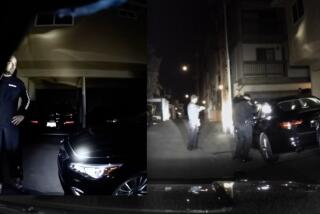Torrance Sued by by Mobile Strikers
A refinery union on strike against Mobil Oil Corp. in Torrance has filed suit in federal court, alleging that Torrance police have interfered with a picket line in front of the refineryâs main entrance by altering traffic signals.
The suit cites an incident that took place Feb. 19, about three weeks after the strike began, when a union picketer was cited in connection with a malfunctioning traffic control signal.
During the morning rush hour, Torrance Police Sgt. Ron Traber said in an interview, automobile traffic on 190th Street had backed up from the refinery entrance, where picketers were stationed, to Hawthorne Boulevard, a distance of about a mile.
âBumper to Bumperâ
âIt was bumper to bumper,â said Traber, who was on the scene.
The congestion on the heavily traveled street had been created by repeated activation of a crosswalk signal at the refinery entrance. Traber said he asked picketers about the signal.
âThe picket captain said, âMaybe it is defective. We donât know what is doing it.â â
Traber said that as he walked toward the signal with a traffic sergeant, picketer Todd Needham withdrew a stick that had been jammed into the signal button.
Union attorney Greg Mooney said an officer ordered Needham to remove the stick and cited him after he did.
Needham was cited for tampering with traffic control equipment, which is a misdemeanor with a fine of $50. The citation later was dismissed because the officer who wrote the citation failed to appear in court, according to Mooney.
Traber said the police reprogrammed the signal device so it would no longer be possible to activate the pedestrian signal across 190th Street and later posted a sign saying that there was no pedestrian crossing.
âOne Hundred Ninetieth Street is the heaviest per lane at peak period in Torrance,â he said. âThe people who were being impacted were people who had nothing to do with the strike. Our position was the strikers did not have to cross the street.â
Mooney said strikers need to cross the street to use restrooms and food shops across the street. Traber said that the picketers had installed portable bathrooms on the refinery side of 190th Street before the strike began.
Mooney said police also interfered with the strikers by connecting another pedestrian signal for the crosswalk across the plantâs driveway, which had not been connected before the strike. The department threatened to cite union members found in the entrance crosswalk during a red light, he said. This made it difficult to talk to motorists entering the plant.
âThe effect is that we have to stand 50 feet away, staring at a âDonât Walkâ sign,â he said. He added that Torrance was âthereby using the police power to curtail our right to picket.â
Traber said no picketers have been cited.
âTheir problem is that they canât stop the cars coming in and talk to them,â he said. âThey canât do that lawfully anyway.â
The suit was filed March 21 in U.S. District Court in Los Angeles, but was not served until last week when the Oil, Chemical and Atomic Workers Union Local 1-547 decided to abandon attempts to solve the matter without litigation. Ralph Nutter, an attorney retained by the City of Torrance for the suit, said he is drafting a response to be filed within 10 days.
The suit against the city is the second one generated by the strike. Mobil obtained a temporary restraining order against the union after alleging on Feb. 5 that the picket line was interfering with access to the refinery. The court order limits the number of picketers at refinery entrances.
The strike was called because of a disagreement over which personnel are to be represented by the union.
More to Read
Sign up for Essential California
The most important California stories and recommendations in your inbox every morning.
You may occasionally receive promotional content from the Los Angeles Times.










